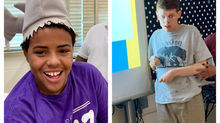College Bound Academy
- Lisa Mihalich Quinn

- May 14, 2018
- 2 min read

Last summer, we were so thrilled to have Dr. Edlyn Peña, an Associate Professor of Higher Education Leadership and Director of the Autism and Communication Center at California Lutheran University join us at Summer Institute to learn about creating social group programs for autistic students who spell or type to communicate.
Edlyn's son Diego uses a letterboard to communicate, and his best-selling book, Anatomy of Autism, is hands-down our favorite bite-sized knowledge bomb, our go-to giveaway for educators and administrators who may need a new perspective on autism from someone who is #actuallyautistic.
This fall, we're so fortunate to be able to welcome Edlyn back to the DC area to present her 3-day workshop, the College Bound Academy. Life after high school is hot topic for so many REV students and others we know. We can't wait to have Edlyn join us again to drop her own knowledge bombs!
The College Bound Academy is a 3-day program which prepares autistic students, ages 14 to 24, who spell and type to communicate to transition to higher education.
Participating students and their communication partners will:
Improve their knowledge of postsecondary options, including accommodations and supports
Acquire knowledge of the college application process
Develop knowledge of college readiness skills
Create a transition plan that outlines individualized goals for college transition
Cultivate a network of college-prepared peers and supports.
Workshop materials are designed by autistic self-advocates and leading scholars who have published research on supporting the needs of students with autism in college.
What are the activities and outcomes of the College Bound Academy workshop?
Explore postsecondary options, including various degrees, college programs, disability support services and accommodations.
Develop knowledge about the college application process, including application deadlines, meeting with a high school counselor, writing personal statements, taking the SAT, and requesting letters of recommendation.
Begin to develop college readiness skills prior to attending college. These college skills—including time management, executive functioning, communication with faculty, self-advocacy, and IEP participation—are deemed necessary to navigating college successfully (Anderson & Butt, 2017).
Create postsecondary transition plans that include goals focused on college access and success, an important predictor for participation in college (AIR, 2013).
Cultivate a network of college-prepared peers and communication partners that will serve as a resource beyond Academy participation.
A limited number of parent / professional tickets will be available for those who wish to attend the Academy to learn about post-secondary planning.
Interested in joining us? Get tickets here.


























.png)

.png)



.png)


Comments